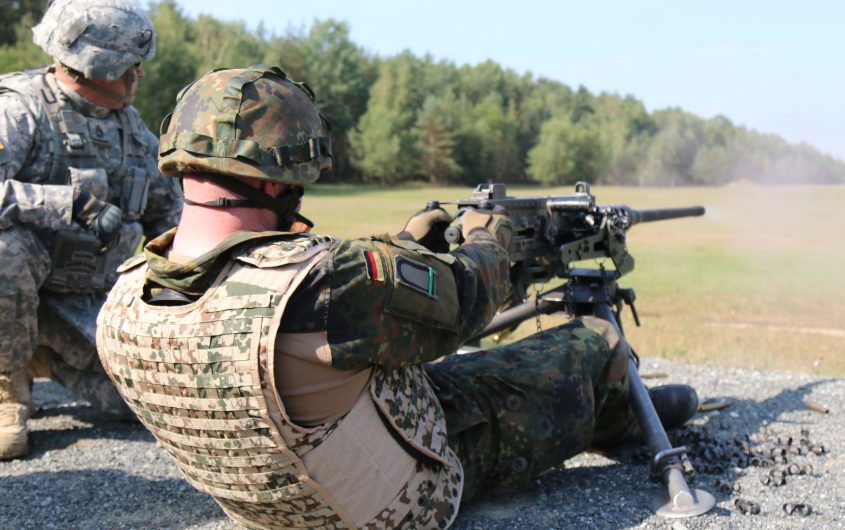
U.S. Army photo by Sgt. Kenneth D. Reed
Germany’s Road Ahead: Four Years into the Munich Consensus

Aylin Matlé
German Council on Foreign Relations
Aylin Matlé is a senior research fellow in the Center for Security and Defense at DGAP. Previously, she has served as the Deputy Head of the Konrad-Adenauer-Stiftung’s Israel office in Jerusalem.
Aylin Matlé holds a PhD from Martin-Luther-Universität Halle-Wittenberg. Her thesis “Drifting Apart of Transatlantic Security: The American Mark on NATO under Barack Obama” examined the impact of the Obama administration on allied and defense policies of European Alliance members. Dr. Matlé worked as a research associate at the chair of international relations and European politics at the Martin-Luther-Universität from 2014-2016. Prior to that, she completed an MA in War Studies at King’s College London in 2014. She holds a bachelor’s degree in Public Management and Governance from Zeppelin Universität, Friedrichshafen.
She was a Fellow in the American-German Situation Room in 2018. In addition, she participated in the AICGS project “A German-American Dialogue of the Next Generation: Global Responsibility, Joint Engagement” from 2018-2019.
It seems that Germany has come a long way since February 2014 when decision-makers proclaimed the “Munich consensus.” In it, then-federal president Joachim Gauck, then-foreign minister Frank-Walter Steinmeier (who has since succeeded Gauck), and defense minister Ursula von der Leyen announced that Germany was ready to assume more responsibility in international security affairs. For what it is worth, Berlin did not dither and instead began living up to its self-proclaimed new responsibility shortly thereafter. While the country has come a long way by its own standards since 2014, many challenges lie ahead, as the following paragraphs will demonstrate.
While the country has come a long way by its own standards since 2014, many challenges lie ahead.
On NATO’s eastern flank, Germany has been the focal point of the Alliance’s short and long-term reassurance and deterrence measures that were set in motion at the September 2014 Wales summit and expanded in 2016 at the gathering in Warsaw. Germany contributed to the conception and implementation of long-term structural changes to NATO’s forces and command structure in response to Russia illegally annexing Crimea and stoking a war in Ukraine that is ongoing. Most notably, in 2016 Berlin agreed to be one of the four lead nations heading NATO’s so-called Enhanced Forward Presence comprised of battalion-sized battle groups deployed to Estonia, Latvia, Lithuania, and Poland. Since early 2017, Germany has served as the framework nation in Lithuania, heading a multinational battalion that the Alliance agreed to dispatch to the three Baltic republics and Poland in order to strengthen NATO’s deterrence and defense posture vis-à-vis Russia at its Warsaw summit in 2016.
While the focus of Germany’s new responsibility is dedicated to deterrence in the east, the situation on NATO’s southern flank was not lost on German decision-makers. Thus, the government decided to do the hitherto unthinkable: send arms into a crisis region. In the fight against ISIS, Germany agreed to provide the Peshmerga with weapons to put a halt to the terrorists’ advance in Iraq. In addition to Germany’s material commitment to the east and south, the country has also lived up to its self-defined new role in other ways, such as deploying soldiers to Mali and co-heading the Normandy format alongside France to solve the Ukraine crisis.
While much has been done on an operational level, it is difficult to discern a sound strategy behind all these actions and commitments—unless assuming more responsibility is a strategy in and of itself.
Despite this impressive list of achievements of the past four years—especially in light of Germany’s history—one should not be lulled into thinking Germany’s security and defense policy has arrived where it should be. While much has been done on an operational level, it is difficult to discern a sound strategy behind all these actions and commitments—unless assuming more responsibility is a strategy in and of itself. So, the question is: What goals does Germany want to achieve with its self-ascribed increased responsibility in European, transatlantic, and international security and defense affairs? What’s the end-game at play? Is it about keeping allies on both sides of the Atlantic happy by finally stepping up? Or is it about defending Germany’s national interest that might differ from its partners? Or maybe both? These questions need to be addressed urgently, especially in light of current foreign minister Heiko Maas’ proposal that Europe represent a counterweight to the United States. As happens so often with lofty words, his bid is far removed from reality when considering the state of play of Germany’s and Europe’s capabilities. Admittedly, Germany has covered quite some ground since 2014, but the journey is far from over.









